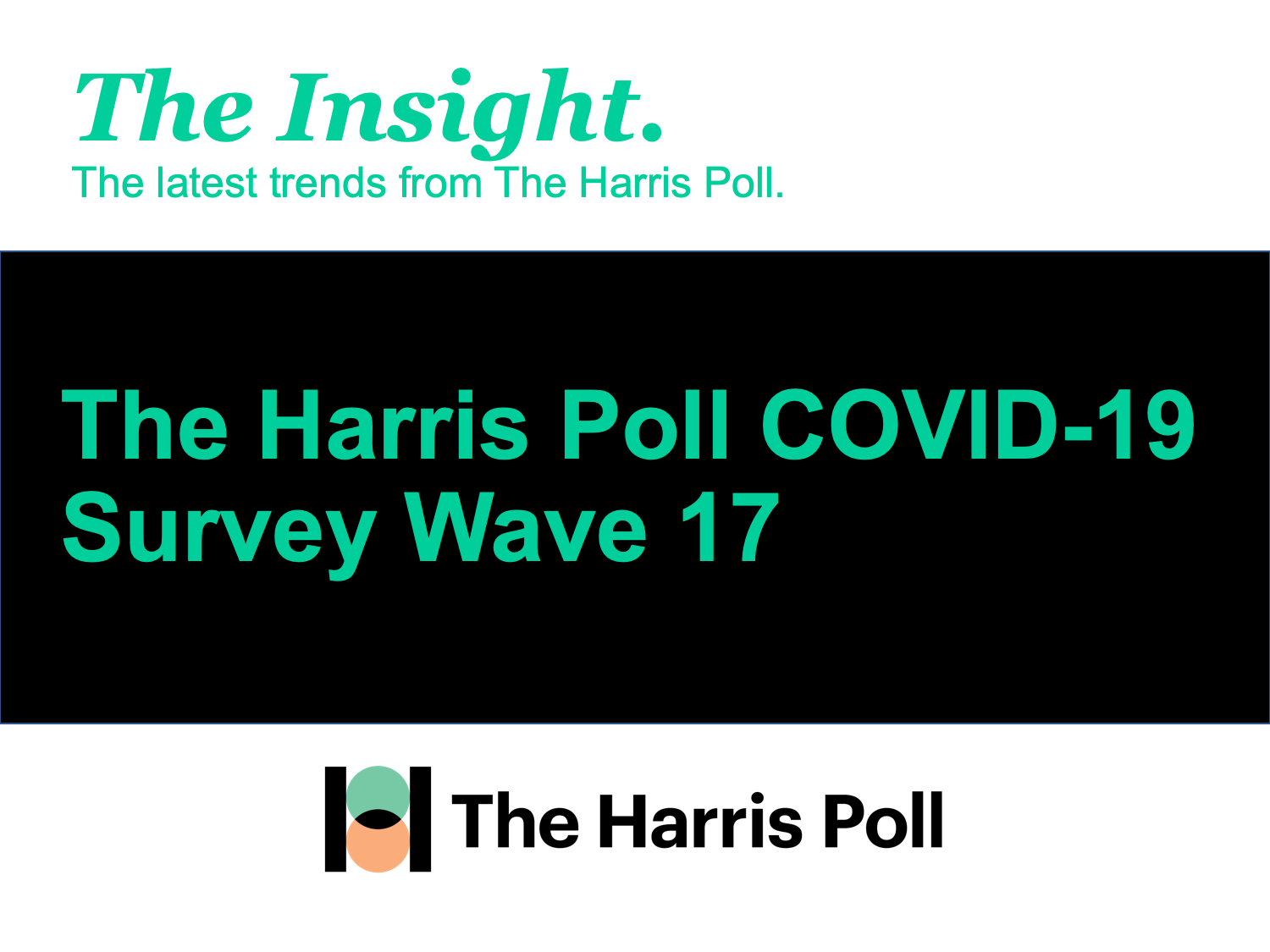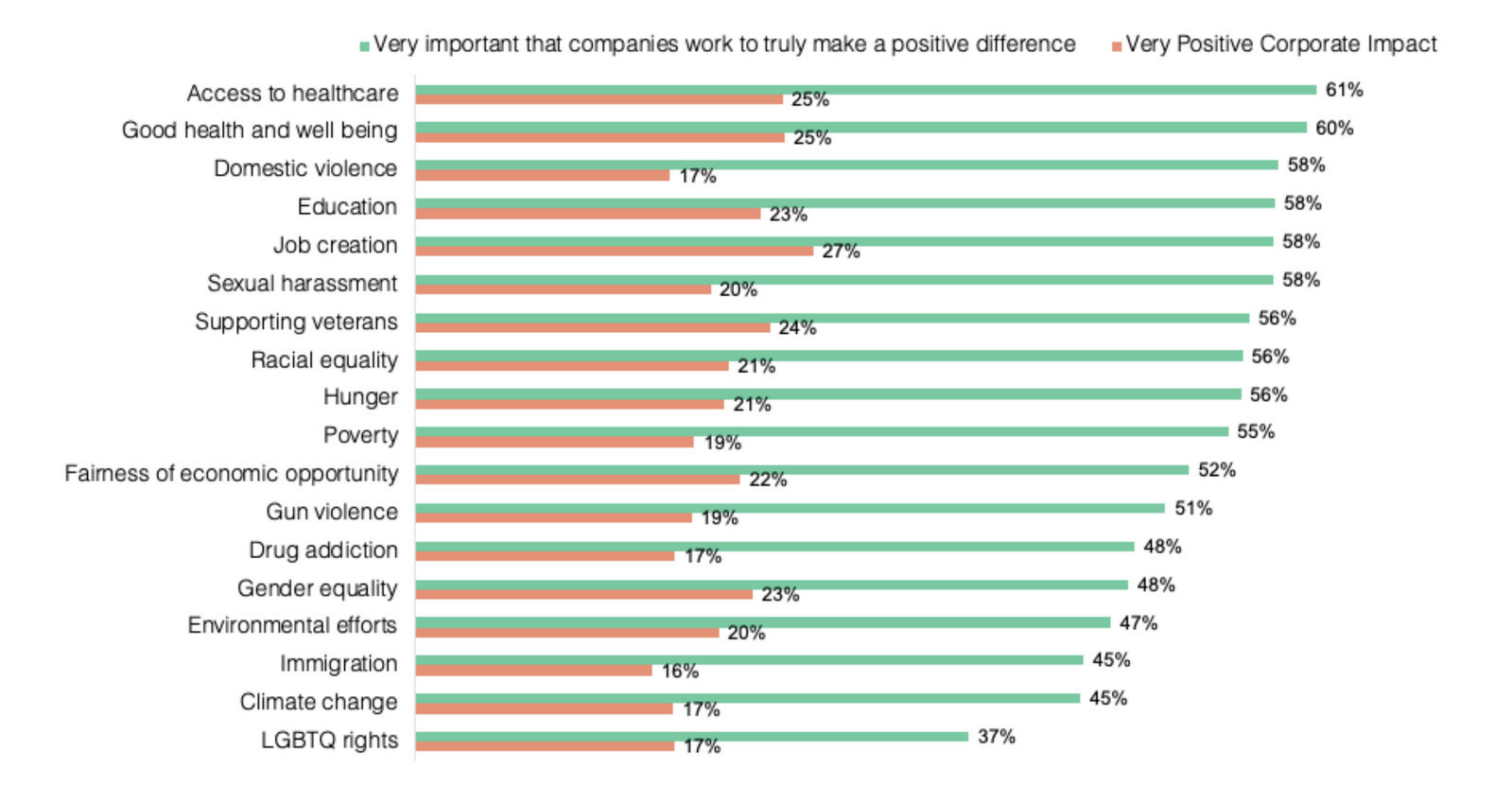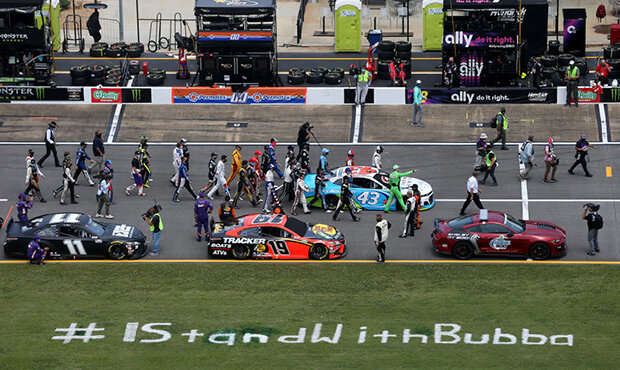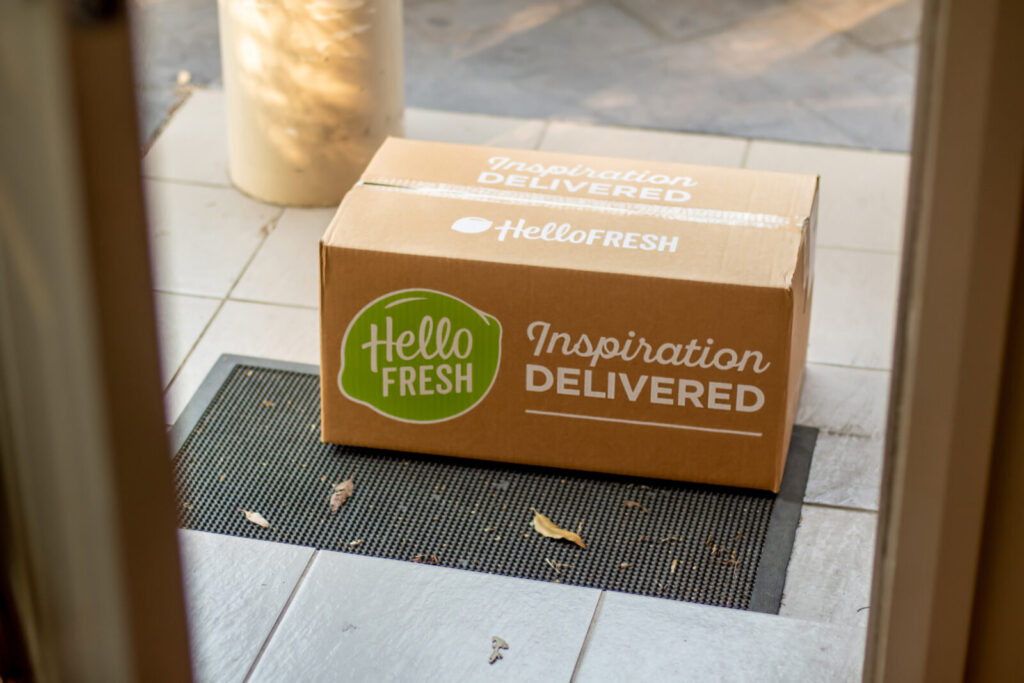Brief • 4 min Read

In Wave 17 of The Harris Poll Cv19, Tracker fielded June 18 through 20, 2020, America’s stress levels rise as the nation experiences a three-pronged crisis – COVID-19 pandemic, economic turmoil, and traumatic events related to systemic racism. The Harvard CAPS-Harris Poll highlighted the economic stress when it found two-thirds of American voters say the US economy is weak.
Amidst fast-moving current events, the Harvard CAPS-Harris Poll also found tremendous support for both Black Lives Matter and the police, while recognizing police misconduct.
Finally, we found that, in the eyes of American consumers, there remains a major gap between urgency and perceived corporate impact with 58% of Americans say companies should incorporate their views into advertising.
As a public service, our team has curated key insights to help leaders navigate Cv19. Full survey results, tables, and weekly summaries can be accessed for free at The Harris Poll Cv19 Portal. We will continue to actively field on a regular cadence to track the shifts in sentiment and behaviors as the news and guidelines evolve.
American Stress
If you seem to feel every week gets a little rougher, you’re not alone: Our new Harris Poll study with The American Psychological Association finds more than 7 in 10 (72%) Americans say that this is the lowest point in the country’s history that they can remember. And that’s causing a lot of stress and anxiety.
- Eight in ten (80%) of Americans say the nation’s future is a significant source of stress. This, following protests over racial injustice—all set against the backdrop of the COVID-19 pandemic—has America on edge.
- Speaking on the Harris-APA data, Arthur C. Evans Jr., APA’s CEO says. “We are experiencing the collision of three national crises—the COVID-19 pandemic, economic turmoil and recent, traumatic events related to systemic racism. As a result, the collective mental health of the American public has endured one devastating blow after another, the long-term effects of which many people will struggle for years to come”.
- Our poll also finds that (55%) of Black Americans say discrimination is a significant source of stress. At the beginning of May, only (42%) said the same. And in the most recent civil unrest poll, more than 7 in 10 Americans (71%) say police violence toward minorities is a significant source of stress.
- Consider the context. Stress is everywhere: We’re lonely (43%) , annoyed (31%), claustrophobic (32%), missing friends and family (76%), eating out (74%), and celebrations like birthdays and holidays (69%). We’re frustrated with online education and when the economy will recover. We fear some things will be changed forever like travel (33% very different) social activities (26%).
- Stress is also taking a toll on young people. In a separate Harris Poll study with The National 4H Council, (60%) of teens said they’re feeling lonely, and more than half said they’re feeling anxious. “It is clear to us based on the survey findings that COVID-19 has had a measurable adverse impact on teens’ mental health,” says Jennifer Sirangelo, CEO of 4-H. “For example, (61%) of teens said that the COVID-19 pandemic has increased their feelings of loneliness.”
- One terrible statistic: the suicide rate among Black youth is rising faster than other young people. “From sheltering at home to economic dislocation, political division, and racial hatred, our mental health and wellness are also under attack.” Says APA’s Evans, “We don’t have to be passive players in mitigating the rapidly increasing stress Americans are facing and its consequences on our health.”
- The age of anxiety: In our latest Harris COVID tracker fielded this past weekend shows that, (80%) of Americans are afraid to leave the home while (79%) while equal numbers (51%) of Americans fear losing their job and dying of coronavirus.
- People also sense loss of human connection. In our surveys, (64%) miss socializing, (76%) seeing friends and family, (74%) going out to dinner, (51%) going to church and so on. Most of the loss of routine is anchored in the loss of daily connection, whether it’s making a run for coffee or seeing a baseball game.
- Have you reached peak stress? Not if you’re an urbanite and freaked out by the rampant rise in illegal fireworks.
- See this Business Insider story on our data and the APA press release. And to go deeper read the full report
- Read our Harris Poll survey in The New York Times on Gen Z and alienation.
Takeaway: Most of the narrative of the past three months has been a public health crisis of the literal kind. Yet the growing nature of this pandemic’s toll, coupled with facing ugly truths of racism and indifference in American society is causing excessive strain on our mental health and wellness. Fortunately, states are re-opening, conversations are ensuing, and our data also shows young people are more apt to seek out therapy and support (it’s not taboo at all). As for the rest of us, Keep Calm and Carry On has worn out its effectiveness.
Whiplash
The Harvard CAPS Harris Poll was released this week showing a startling turn in American sentiment on a number of measures.
- Almost two-thirds (64%) of Americans now say the country is on the wrong track and the number of voters who see the country on the right track (27%) is now at an all-time low for our poll.
- The survey was overseen by Harris Poll Chairman Mark Penn also found nearly two-thirds of voters (61%) say the U.S. economy is weak – a stunning three month flip in attitudes from (25%) in mid-December.
- Yet while economic confidence is still low, it is showing some signs of rebounding with those saying the economy is on the right track ticking up 3pts to (30%) and the pessimists declining 5 pts to (60%).
- Also, the combination of PPP, states re-opening, and an improved stock market have resulted in views on American’s personal finances to stabilize as the number of voters who say their economic situation is declining is now decreasing from (40%) in March to (31%) today. (42%) say their economic situation is the same and (22%) say it’s improving.
- The green shoots of optimism are tempered in that almost half (49%) of American voters still expect the U.S. to be in a recession six months from now.
- Despite majority support for utilizing the national guard, President Trump’s approval declined by 4 points for the second month in a row; he’s now at (43%). He receives low marks in the low 40s for his handling of the coronavirus (44%), issues of race and policing (43%), and responding to civil disorder (42%).
- Other stats that caught our eye…President Trump (39% favorable; 56% unfavorable) vs. his presumed contender, Joe Biden (47% favorable; 44% unfavorable); The U.S. Military scores highest (80% favorable; 12% unfavorable) while Bill DeBlasio brings up the rear (21% favorable; 39% unfavorable).
- What does the Fall campaign stump look like? The coronavirus remains the biggest issue facing Americans today. Today, (61%) think infections are growing faster (up from 49% in May), 64% think we are opening up too soon, and (74%) think there will be a second wave in the Fall.
- Read more: What We Know—and Really Don’t Know—About the Future of COVID-19 Vaccines
- Read the full report and listen to Mark’s Podcast.
Takeaway: As America fights COVID, debates police reform and fights for justice, voters typically vote on the economy, jobs, and the sense of the direction of the country. All of them have a large room to improve, but it’s only Summer…
The Safety Dance
Public opinion can be messy and contradictory, especially as attitudes are shifting. Some things become imprinted while others snap back… But this week The Harvard CAPS Harris Poll found nearly equal support for policing and Black Lives Matter:
- There is tremendous support for both Black Lives Matter and the police: Police in America is viewed favorably by 62% of voters (32% unfavorable) and Black Lives Matter is viewed favorably by 55% of voters (33% unfavorable). Most voters (64%) also think that most police operate according to the rules, while (36%) say they operate in biased and unfair ways. Voters are also against defunding the police (72%).
- But voters recognize police misconduct: Majorities of voters recognize police misconduct in cases like the death of George Floyd are fairly common (56%) including (86%) of Black people of all ages. Majority call for reform but are split on how: overwhelming majorities support mandatory body cameras (88%) and banning choke holds (79%). But voters are split between the need for major reforms and restructurings of how police works (47%) and minor reforms and improved training (46%).
- Our Harris Poll study shows genuine empathy for the movement among people of all ages and hopes that advancements against systemic racism will finally happen. Today (58%) of Americans now believe that racism is systematic and pervasive in America and (63%) believe that the recent events in the movement for racial equality and justice will result in meaningful changes as to how black people are treated in America.
- But the problem is the complex intertwining of safety with protests: Americans have the tendency to see them as trade-offs in a zero-sum game. While over two thirds (67%) of voters in the recent Harvard Harris Poll thought the protests in response to the deaths of George Floyd were an appropriate response to police fatalities, on the issue of riots and looting (47%) of voters believed cities were too soft in their response.
- America wants change but not with disorder: When asked, which of the following problems in the news do you want your political leaders to tackle the most, there is near equal desire for leaders to address both civil disorder (24%) and issues of race and policing (28%); trying to solve two competing issues at the same time creates a lot of discord and discomfort.
- We are entering the most important but uncomfortable part of a Paradigm Shift, which is disorientation, an unavoidable but necessary step in the process of adopting a new way of doing things. This is the hardest step because it requires the most amount of change which can be uncomfortable and can make some people fear loss of normalcy: just last week, (49%) of Americans said protecting private property from damage is more important than protecting the freedom, rights and safety of Black Lives Matter protests. Change can also be alienating, in fact (63%) of Americans agree “what you think doesn’t matter anymore.”
- While change feels radical, the output is not, in fact it’s an outcome that most Americans say is important to them personally; changing the conditions that black communities are living and existing in, in order to create a world that is more just and equitable.
- Follow the money: The protests fuel record traffic to donation sites. “Visits to police reform organization sites grew tremendously year over year — in looking at daily traffic trends, these sites went from receiving less than 1,000 visits per day to nearly 88,000 visits per day during the first two weeks of June,” said Ilana Marks, Marketing Analyst at Similarweb.
Takeaway: Americans, corporations, leaders have all joined in the movement to finally put teeth into Black Lives Matter. But the underlying social constructs in racism are built on layers and layers of White American fear in losing status, wealth and property. We need to advance and protect the lives of Black Americans by not only joining the movement, but dismantling this trope that is as old as the country itself and still seen in the data we’ve shared above.
Americans to Companies: “Do More For Society”
New Harris Poll data finds that the American public is rooting for companies to make a positive difference on social issues, but there is a gap between urgency and perceived corporate impact:
- This weekend we asked Americans how important it is that companies work to truly make a positive difference on specific societal issues and how much of a positive impact they have seen from corporate America. What we found is a large gap between the desire for corporate impact and the perceived positive impact from companies:

- The time to act is now: (58%) say companies should incorporate their views into advertising; (51%) say companies should speak out on racial inequality in America, but there is more work to be done on the inside: (43%) say companies have not done enough to increase diversity in their leadership and nearly a third (28%) say their employer has not made meaningful efforts internally to address racial inequality.
- The ‘company’ you keep matters: Reputation isn’t just messaging matching values but also the company you keep: Nearly three-quarters of Americans (72%) say companies should ensure businesses they do business with share similar standards when it comes to combating racial inequality (up 5 pts from last week) and (61%) say they are more likely to buy from companies that contribute to organizations that combat racism.
- The public welcomes Corporate America to step up for racial inequality, but there is ground to make up: Eight in ten (82%) say it’s very/somewhat important to them personally, that companies work to truly make a positive difference on racial equality, but only (21%) say companies have made a very positive impact.
- Also, the Harvard Harris Poll found (69%) of voters do not believe that news editors or CEOs should lose their jobs if they criticize Black Lives Matter, at the same time as 6 in 10 support corporations donating millions of dollars to the BLM movement.
- One thing is clear, nobody wants to be a ‘Karen’. Babynames.com reports that Karen as a baby name is down 75%.
Takeaway: What a company does is more important than what it says, and here, metrics matter. Company messaging is appropriate, but only if you have your house in order. This means representation in leadership, boards and a culture that isn’t toxic and stymying. It means eliminating biases in hiring and promotion; and design thinking around Black experience in your products, your customer satisfaction, your operations daily management interactions. Many companies (including ours) are behind, so set targets, show your struggles and find safe spaces for Black voices. Tie progress to compensation and performance and find other ways to make it stick. This isn’t window-dressing, but fundamental social, enterprise and personal change.
The Kids Are Not Alright
This was pretty much inevitable. Back on May 15th (seems like five years ago) we reported there was a generational war brewing over COVID and safety.
- Americans over 50 said the nation’s youth are acting ‘young and reckless’ during C-19: Three quarters (75%) said that young people act as if social distancing restrictions don’t apply to them and (73%) said youth are acting recklessly (72%) said they are putting the rest of the nation’s health at risk.
- At the same time, more than half of younger Americans age 18-49 (56%) say the over-fifties crowd is stubbornly sticking to their routines even though they are more at risk.
- But younger people might be more averse to following recommended safety precautions: Gen Z/Millennials are the least likely of all generation to have a positive view of people who use PPE in public spaces (59% vs 69% Gen X, 67% Boomers, and 81% Seniors) and they are least likely to commit to wearing PPE long term until a vaccine is created (35% vs 47% of Seniors).
- Fear of the pandemic is not abating: the percentage of Americans saying the fear of Cv19 is sensible given how serious the pandemic is remains unchanged (71%) since May 15th.
- One theory: Old people are trying to escape areas of young people: Harris Poll data in the Wall Street Journal and on CNBC this weekend showed the continuing flux of city residents fleeing to the countryside in a way that may be more than just a Summer jaunt. In the U.S., (39%) of urban dwellers said the Covid-19 crisis prompted them to consider leaving for less densely populated areas, according to a Harris poll of 2,050 adults conducted in late April.
- This comes as COVID cases rise across the country. While deaths are declining, The CDC updated the COVID-19 Forecasts for the U.S. suggesting that there will likely be between 124,000 and 140,000 total reported COVID-19 deaths by July 4th. The state-level ensemble forecasts suggest that the number of new deaths over the next four weeks in Arizona, Arkansas, Hawaii, North Carolina, Utah, and Vermont will likely exceed the number reported over the last four weeks. For other states, the number of new deaths is expected to be similar or decrease slightly compared to the previous four weeks.
- As such, (77%) of Americans think the lockdowns were effective and (79%) are worried about a new wave. Facing uncertainty, most Americans are taking a practical approach to the future; 71% support another lockdown if there’s another surge in cases.
Takeaway: Fault lines are developing not only between young and old but the politicizing of face masks. There are the ‘anti-maskers’, who like anti-vaxxers ignore science and fact. But the truth is America is in a plateau, not a decline. And most Americans get this: (79%) fear the second wave of COVID, but the reality is we haven’t beaten down the first.
Please, Is There Some Good News?
Set against this backdrop of stress and anxiety, we thought it might be time for some hope and optimism, so consider these stories that happened this week:
- Orthodox Jews in Crown Heights have taken up the cause of Black Lives Matter. Given the history of racial strife and rioting in this neighborhood, it seems young people are taking up the torch of inclusivity. (61%) of Gen Z/Millennials say moving forward, racial equality will be very important to them personally vs only (49%) of Boomers and (45%) of Seniors. They are also the most optimistic: 75% of Gen Z/Millennials believe the recent events in the movement for racial equality and justice will result in meaningful changes as to how Black People are treated in America (vs only 52% of Seniors).
- NASCAR drivers push Bubba Wallace’s #43 Victory Junction Chevrolet to the front of the grid as a sign of solidarity prior to the NASCAR Cup Series GEICO 500 at Talladega. (A noose was found in Wallace’s garage stall at Talladega a week after the organization banned the Confederate flag at its facilities, Axios reported).

- And finally, two-thirds of Americans (66%) in our USA-Today Harris Poll said they supported making Juneteenth a national holiday — the official end to slavery that was commemorated last Friday, June 19th. Younger were more likely to support (81%) vs. older 58%. And Black Americans support at (84%) compared to White Americans (61%), and Hispanics (67%).
Takeaway: We’ll let the good news speak for itself.
Subscribe for more Insights
Subscribe to our newsletter for the latest trends in business, politics, culture, and more.
Download the Data
This survey was conducted online within the U.S. by The Harris Poll from June 18 to 20 among a nationally representative sample of 1,962 U.S. adults.
Download
Subscribe for more Insights
Subscribe to our newsletter for the latest trends in business, politics, culture, and more.
Download the Data
This survey was conducted online within the U.S. by The Harris Poll from June 18 to 20 among a nationally representative sample of 1,962 U.S. adults.
DownloadRelated Content








